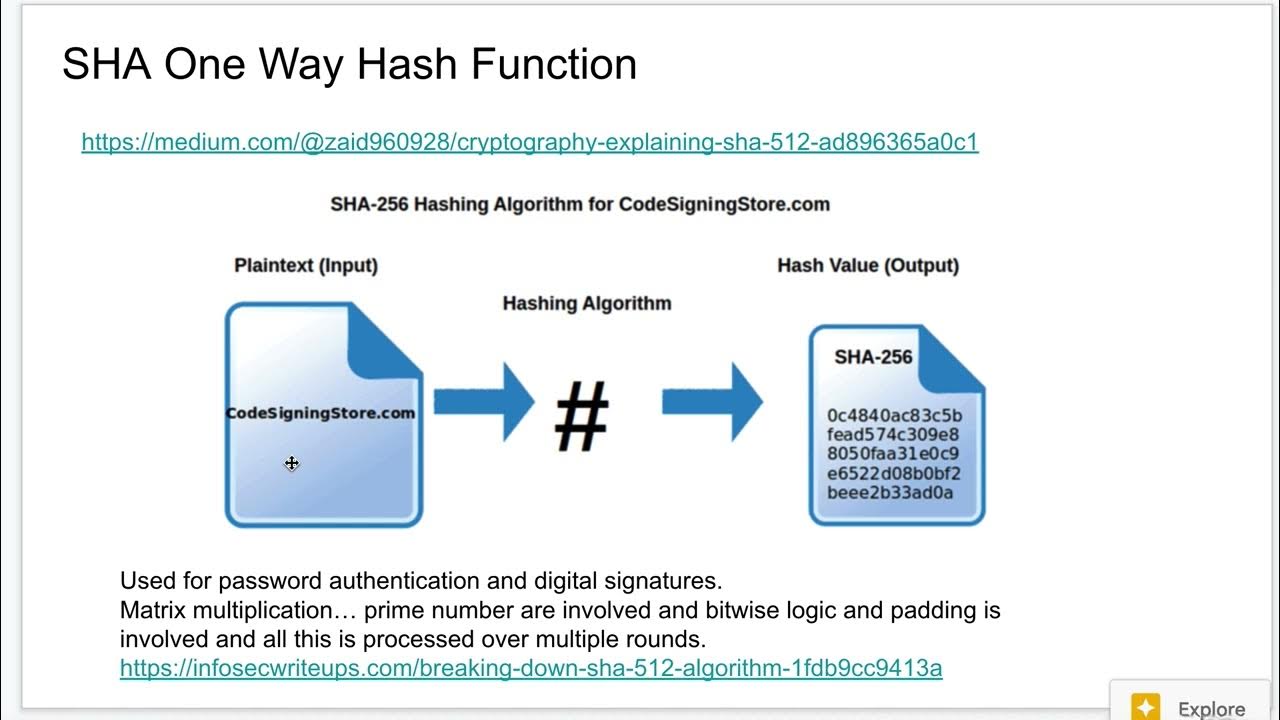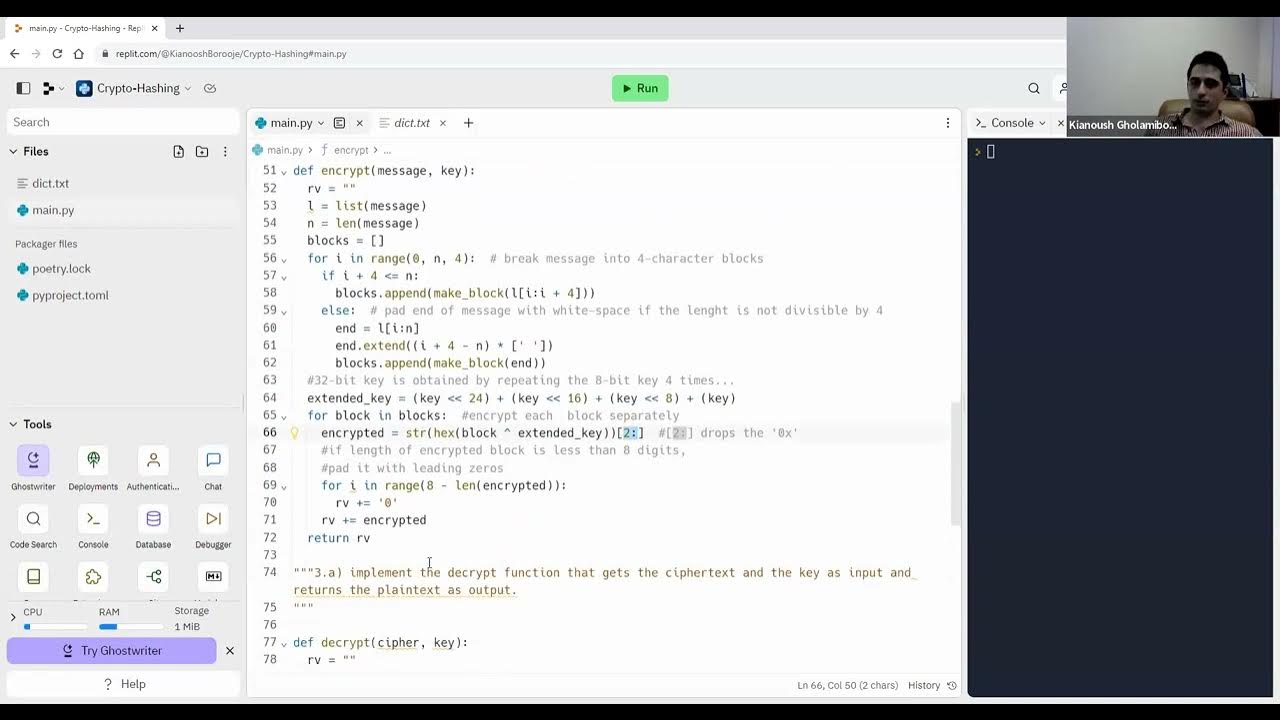How secure is 256 bit security?
Summary
TLDRThe video script delves into the immense complexity of breaking 256-bit cryptographic security, using the example of guessing a specific SHA-256 hash. It illustrates the sheer scale of computational power needed by comparing it to 1 kilo-Google, half the world's population with such power, and even a fraction of the Milky Way's stars. The script highlights the efficiency of application-specific integrated circuits used in Bitcoin mining, which surpass the capabilities of GPUs by a significant margin. It concludes with a milestone achievement of the channel surpassing 2 to the 18th subscribers and an invitation for a Q&A session.
Takeaways
- 🔒 The security of cryptocurrencies relies on the difficulty of guessing a 256-bit string, which is astronomically high, making it secure against brute force attacks.
- 🖊️ Digital signatures and cryptographic hash functions are two contexts where the security of a 256-bit string is crucial.
- 🔍 Finding a specific SHA-256 hash requires guessing and checking random messages, which on average takes 2^256 attempts.
- 🌌 The number 2^256 is so large that it's difficult to comprehend; it's like multiplying 4 billion by itself 8 times.
- 💻 A powerful GPU can perform nearly a billion hashes per second, but even then, it's far from being able to guess a 256-bit string in a reasonable time.
- 🚀 Imagining 4 billion powerful computers running hashes, each equivalent to a 'kilo-Google' of computing power, gives a sense of the scale needed to approach 2^256 guesses.
- 🌍 If every person on Earth had a kilo-Google of computing power, it would be a massive but still insufficient number of guesses to find the correct hash.
- 🌌 The Milky Way has an estimated 100 to 400 billion stars, and if every star had an Earth with half the population having a kilo-Google, it would still be a small fraction of the guesses needed.
- 🕊️ Even with a 'giga-galactic supercomputer' running for 37 times the universe's age, the chance of finding the correct guess would remain infinitesimal.
- 💎 Bitcoin miners use application-specific integrated circuits (ASICs) that are 1000 times more efficient than GPUs for hashing, significantly increasing their guessing rate.
- 🎉 The channel has surpassed 2^18 subscribers, highlighting the large scale of numbers involved in both the subscriber count and cryptographic security.
Q & A
What is the significance of a 256-bit string in the context of digital security?
-A 256-bit string represents an extremely large number of possible combinations, making it incredibly difficult to guess or break through brute force. This level of complexity is used in digital signatures and cryptographic hash functions to ensure security.
Why is guessing a specific SHA-256 hash considered infeasible?
-Guessing a specific SHA-256 hash is infeasible because it would require, on average, 2 to the 256 guesses. This number is astronomically large, making it practically impossible to find the correct hash through random guessing.
How does the script illustrate the scale of 2 to the 256 guesses?
-The script breaks down 2 to the 256 into more comprehensible parts by relating it to 2 to the 32, which is 4 billion, and then multiplying this by itself 8 times to get a sense of the sheer magnitude of the number.
What is the role of a GPU in cryptographic hash functions?
-A GPU can perform a large number of computations in parallel, making it useful for running cryptographic hash functions repeatedly at high speeds, potentially up to a billion hashes per second.
How does the script compare the computational power of a single computer to that of Google's servers?
-The script imagines filling a computer with enough GPUs to run 4 billion hashes per second, then compares this to Google's estimated millions of servers, suggesting that even Google's vast infrastructure would be less powerful than this hypothetical setup.
What is the concept of 'kilo-Google' in the script?
-The 'kilo-Google' is a hypothetical unit of computing power, representing 1,000 times the power of the imagined GPU-packed computer, used to illustrate the scale of computational power needed to deal with 2 to the 256 guesses.
How does the script relate the number of people on Earth to the scale of computational power?
-The script imagines giving each of the 7.3 billion people on Earth a personal 'kilo-Google' worth of computing power, to further emphasize the immense scale required to handle the number of guesses needed.
What is the 'giga-galactic supercomputer' in the context of the script?
-The 'giga-galactic supercomputer' is a hypothetical construct that represents 4 billion copies of the Milky Way, each with a full Earth's worth of 'kilo-Google' computing power, running guesses at an unimaginable rate.
How long would it take for the 'giga-galactic supercomputer' to have a chance of finding the correct guess?
-Even with the immense computational power of the 'giga-galactic supercomputer' running for 507 billion years, which is 37 times the age of the universe, the chance of finding the correct guess would still be only 1 in 4 billion.
What is the current state of Bitcoin hashing and how does it compare to the kilo-Google?
-The current state of Bitcoin hashing involves miners using application-specific integrated circuits that are about 1000 times more efficient than a GPU, allowing them to guess and check at a rate of about 5 billion billion hashes per second, which is one third of the kilo-Google's capacity.
Why are ASICs more efficient than GPUs for Bitcoin mining?
-ASICs, or Application-Specific Integrated Circuits, are designed specifically for the task of Bitcoin mining, optimizing the SHA-256 hashing process and eliminating the need for general computation capabilities, leading to significant efficiency gains.
Outlines

This section is available to paid users only. Please upgrade to access this part.
Upgrade NowMindmap

This section is available to paid users only. Please upgrade to access this part.
Upgrade NowKeywords

This section is available to paid users only. Please upgrade to access this part.
Upgrade NowHighlights

This section is available to paid users only. Please upgrade to access this part.
Upgrade NowTranscripts

This section is available to paid users only. Please upgrade to access this part.
Upgrade NowBrowse More Related Video
5.0 / 5 (0 votes)





